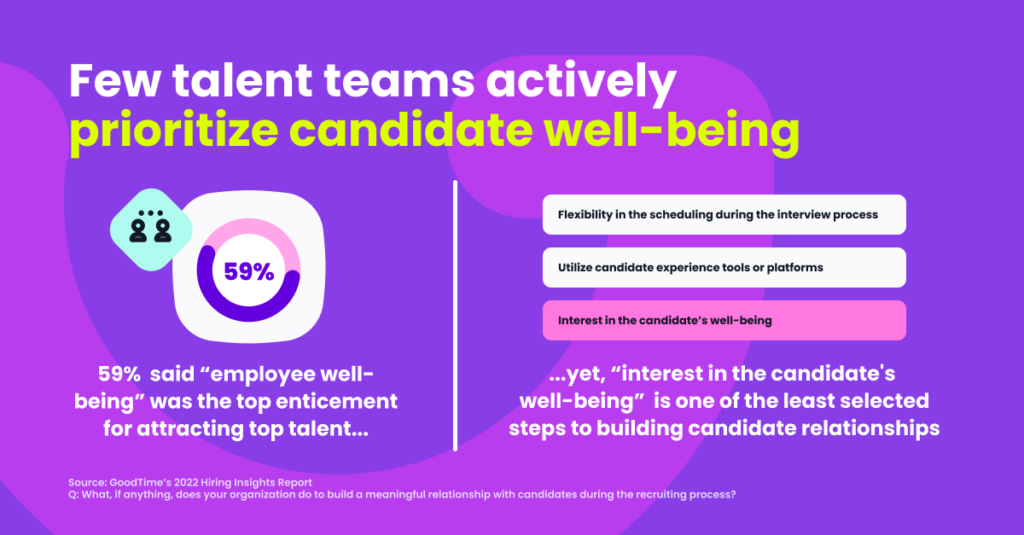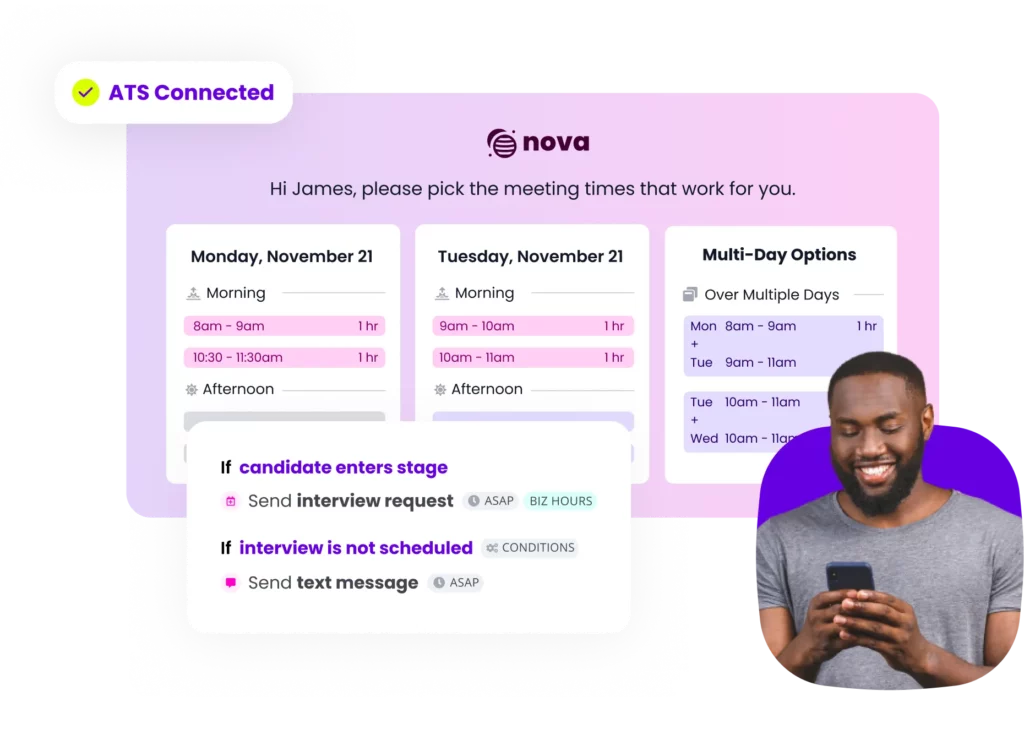Table of Contents
Let’s cut to the chase: many hiring teams struggle to prioritize candidate well-being (and we have the data to back this up).
Even though teams recognize the importance of employee well-being, most neglect to focus on the well-being of future employees—AKA, candidates. Our Hiring Insights Report makes this fact as clear as day.
Fifty-nine percent of HR and talent leaders from our report consider “employee well-being” to be the top enticement for attracting candidates. However, when asked what they do to build relationships with candidates during the recruiting process, “interest in candidate’s well-being” came in as the third least selected response.

The way that candidates are treated in the hiring process alludes to how they’d be treated as employees. If a hiring team tells talent that they support their employees’ well-being, yet they don’t show the same support to candidates, then candidates likely won’t believe them.
Actions speak louder than words. It’s cliché, but oh so true. So, to help recruiters actively improve candidate well-being, we’ve put together this handy list of ways to make the well-being of candidates a top priority.
1. Never Leave a Candidate Hanging
Sometimes candidates ghost recruiters, and other times recruiters ghost candidates. We get it; getting caught up in balancing schedules and chasing down interviewers can cause things to slip through the cracks.
But still, you have to maintain consistent communication with candidates. Interviewing can be a high-stress ordeal for candidates, and dropping contact with them out of nowhere can kick their stress into overdrive. And yes, you guessed it; ghosting candidates significantly hinders their well-being.
If locking down interviewers to set up a second interview takes you longer than expected, give candidates a quick status update to show that you haven’t forgotten about them. Not only will this prove that you value their time, but it’ll also dissuade them from brushing your company aside and looking for opportunities elsewhere.
2. Remember: DE&I Is Part of Candidate Well-being
Promoting candidate well-being means uplifting it for all candidates, and that means candidates from underrepresented groups. A hiring team isn’t truly considering the well-being of diverse candidates if their commitment to DE&I is last in line.
Proving your commitment to DE&I doesn’t have to mean enacting time-consuming, costly initiatives. It can be as simple as ensuring that diverse individuals make up your interview panels. If a candidate sees themselves represented in an interview panel, they’re more likely to feel that they’d be represented and cared for at a company.
3. Collect Candidate Feedback to Squash Any Misconduct
Imagine having one of your interviewers treat a candidate unfairly. Terrible, right? It can be hard to sniff out instances of misconduct against candidates without asking the candidates themselves.
So…why not do exactly that? Collecting candidate feedback through surveys helps guarantee that candidates are treated the way that they deserve. Better yet, surveys also allow you to continuously reengineer your hiring process to meet the expectations of talent.
And if you need any more convincing, consider this: 68% of candidates would like to provide feedback after an interview. However, 75% report rarely or never being asked for their opinion. Pass the mic to your candidates!
4. Train, Train, Train Your Interviewers
Interviewers can make or break a candidate’s experience with your company. Well-trained interviewers ensure that candidates feel valued, heard, and appropriately challenged. When you add all of that up, you get an interviewing experience that’ll leave candidates smiling. Why wouldn’t you train your interviewers?
The best way to learn is through experience, which is why we recommend establishing a process where new interviewers shadow seasoned interviewers. During the shadowing stage, new interviewers should learn the best questions to ask and the most impactful ways to connect with candidates.
5. Don’t Underestimate the Value of Small Talk
Small talk gets a bad rap, but there’s actually science behind its positive effects on mood. When interviewing candidates, engaging in small talk is the way to go. Diving head-first into your interview questions without a bit of light chitchat can make the interviewing experience feel robotic and impersonal. Small talk does wonders in easing a candidate’s stress.
And believe us—there’s likely at least an ounce of stress on the candidate’s side. No matter how many interviews a candidate’s sat through, interviewing is a holistically nerve-wracking experience. By starting off with some light small talk, you’ll not only alleviate any anxiety, but will also help candidates feel confident that your company cares about them as a human—not just a potential new hire.
Upgrade your candidate experience without sacrificing your time
The number one way to improve your candidate experience is by respecting their time, moving quickly, and automatically collecting insights to understand and improve your processes. GoodTime makes all of that a cinch!
AI for more human hiring
Interview scheduling is just the start. Use human-centric AI to elevate your hiring experience while automating 90% of interview scheduling tasks — for any role, in any place, at any scale.





